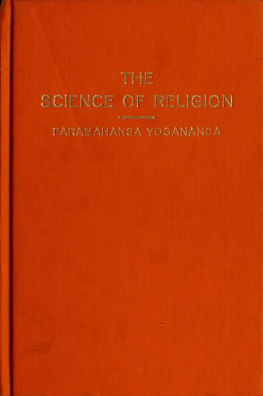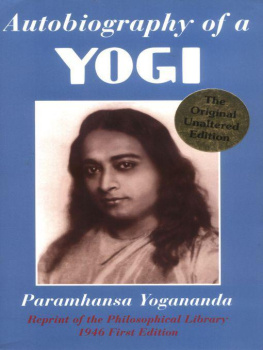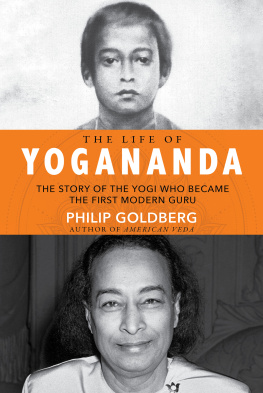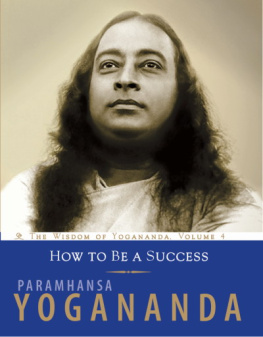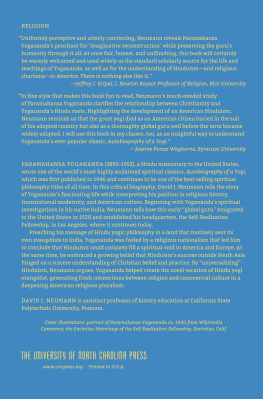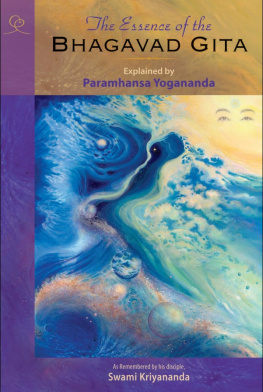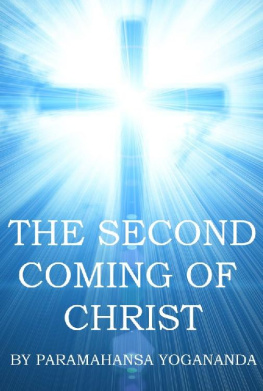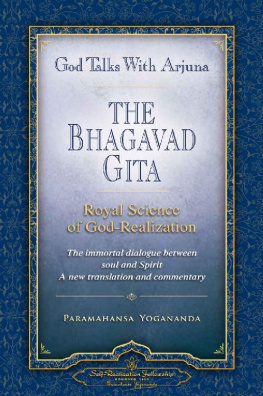Yogananda - The science of religion
Here you can read online Yogananda - The science of religion full text of the book (entire story) in english for free. Download pdf and epub, get meaning, cover and reviews about this ebook. City: Los Angeles, year: 1972, publisher: Self-Realization Pub. House, genre: Religion. Description of the work, (preface) as well as reviews are available. Best literature library LitArk.com created for fans of good reading and offers a wide selection of genres:
Romance novel
Science fiction
Adventure
Detective
Science
History
Home and family
Prose
Art
Politics
Computer
Non-fiction
Religion
Business
Children
Humor
Choose a favorite category and find really read worthwhile books. Enjoy immersion in the world of imagination, feel the emotions of the characters or learn something new for yourself, make an fascinating discovery.
- Book:The science of religion
- Author:
- Publisher:Self-Realization Pub. House
- Genre:
- Year:1972
- City:Los Angeles
- Rating:5 / 5
- Favourites:Add to favourites
- Your mark:
- 100
- 1
- 2
- 3
- 4
- 5
The science of religion: summary, description and annotation
We offer to read an annotation, description, summary or preface (depends on what the author of the book "The science of religion" wrote himself). If you haven't found the necessary information about the book — write in the comments, we will try to find it.
The science of religion — read online for free the complete book (whole text) full work
Below is the text of the book, divided by pages. System saving the place of the last page read, allows you to conveniently read the book "The science of religion" online for free, without having to search again every time where you left off. Put a bookmark, and you can go to the page where you finished reading at any time.
Font size:
Interval:
Bookmark:
This book made available by the Internet Archive.




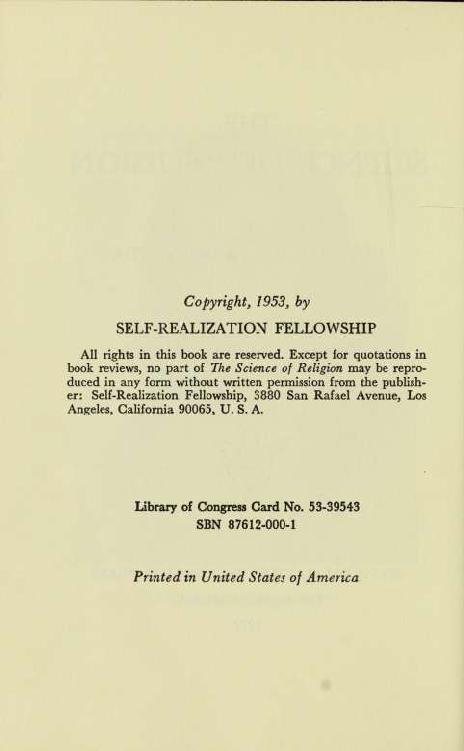
For his piety, generosity to many worthwhile movements, and pioneer patronage in the establishment of Togoda Satsanga residential school for boys in %anchi, ^ihar, India,
This book is lovingly inscribed to the late Honorable Maharaja Sri Manindra Chandra Nundy of Kasimbazar, bengal.
PREFACE
This small book offers the clue to the universe.
Its value is beyond estimation in words, since between these narrow covers is to be found the flower of the Vedas and Upanishads, the essence of Patanjali, foremost exponent of the Yoga philosophy and method, and the thought of Sankara, greatest mind that ever dwelt in mortal body, placed for the first time within reach of the multitude.
This is the deliberate statement of one who has at last found in the East, after many wanderings, the solution to the riddles of the world. The Hindus have revealed to the whole world the Truth. And this is only natural, when we consider that more than five thousand years ago, while the forefathers of Briton and Gaul, Greek and Latin, were roaming the vast forests of Europe in search of food, true barbarians, the Hindu was already engaged in pondering the mystery of life and death, which now we know to be one.
The essential point to be remarked about Parama-hansa Yogananda's teaching, in contradistinction to that of European philosophers, such as Bergson, Hegel, and others, is that it is not speculative, but practical, even when dealing with the utmost reaches of metaphysics. The reason is that the Hindus, alone of mankind, have penetrated behind the veil, and possess the knowledge, which is really not philosophical, i.e., wisdom-loving, but
wisdom itself. For, when expressed in terms of verbal dialectic, this knowledge must perforce lay itself open to the criticism of philosophers whose life it is, as Plato said, to be constantly engaged in discussion. The truth cannot be expressed in words, and when words are used, even by a Sankara, acute minds can always find a loophole for attack. The finite, in fact, cannot contain the infinite. Truth is not an eternal discussion; it is Truth. It follows that only by actual personal realization, by practice or method such as Paramahansa Yogananda offers can Truth ever be known beyond doubt.
All the world desires bliss, as Paramahansa says and proves, but most are deluded by desire for pleasure. Buddha himself never stated more clearly that it is desire, ignorantly followed, which leads to the morass of misery in which the vast majority of mankind is helplessly floundering.
But Buddha failed to state with equal clearness the fourth of the four modes of attaining to the state of bliss that we all desire. This fourth mode is by far the easiest, but needs for its practical achievement the guidance of an expert. This expert is now among us to give to the West the technique, the simple rules, which have been handed down for centuries from the ancient philosophers of India, and which lead to realization or the state of permanent bliss.
This direct contact is always stressed as of great importance in Hindu thought and practice. Until our day, it has been out of reach of all but those fortunate enough to dwell in India. Now that we have it in the West,
actually at our door, he would indeed be unwise, who should avoid or neglect to make trial of a practice which of itself is intensely blissful"far more purely blissful than the greatest enjoyment that any of our five senses or the mind can ever afford us," as Paramahansa Yoga-nanda truthfully declares, and adds, "I do not wish to give anyone any other proof of its truth than is afforded by his own experience."
The first step can be taken by reading this small book; the others needful for reaching the complete state of bliss will follow, naturally.
I conclude by quoting a few lines from my "John of Damascus," in which I attempt poetically to suggest what in this book is attained. The Buddha speaks, who for us is Paramahansa Yogananda, since "Buddha" means simply, "He who knows."
Long have I wandered, long, he sang, Bound by the chains through lives and pains Innumerable, and felt the fangs Of self on fire, of fierce desire.
Found, it is found, the Cause, he sang. Of self on fire, of wild desire. No house, O Architect, for me Again can ever builded be.
Shattered are thy rafters, scattered
Are thy roof timbers utterly:
No house thou buildest more for me.
Mine is Nirvana, mine; it lies Within my reach, before mine eyes. Now, if I will it, now, I may Pass now eternally away To bliss eternal, leave no trace Of me in this or other place.
But love I bear thee, love; and stay, Humanity, for thy sole sake. With mine own hands the bridge to make. Which, if thou cross, thou too ahalFst gain Freedom from birth and death and pain. And thus eternal bliss attain.
We have the Bridgemaker among us. With his own hands he will build the bridge, if we truly wish him so to do.
Douglas Grant Duff Ainslie
February, 1927 London, England
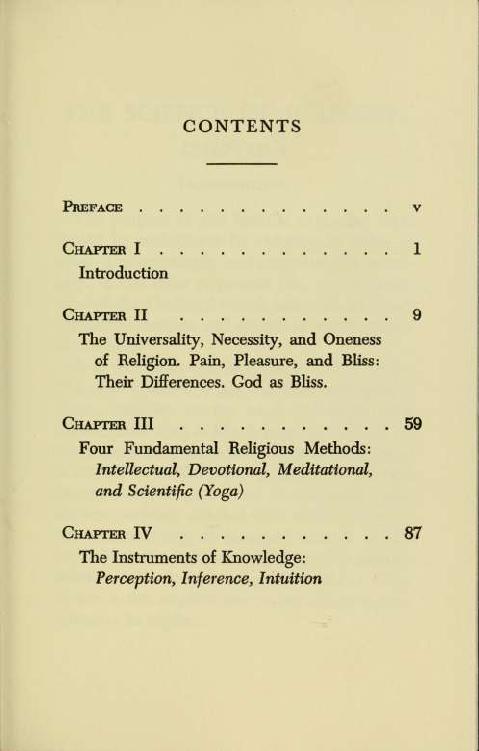
THE SCIENCE OF RELIGION
CHAPTER I
Introduction
The purpose of this book is to outline what should be understood by religion, in order to know it as universally and pragmatically necessary. It also seeks to present that aspect of the idea of the Godhead which has a direct bearing on the motives and actions of every minute of our lives.
It is true that God is Infinite in His nature and aspects, and it is also true that to prepare a chart detailing, so far as is consistent with reason, what God is like is only an evidence of the limitations of the human mind in its attempt to fathom God. Still, it is equally true that the human mind, in spite of all its drawbacks, cannot rest perfectly satisfied with what is finite. It has a natural urge to interpret what is human and finite in the light of what is superhuman and infinitewhat it feels but cannot express, what within it lies implicit but imder circumstances refuses to be explicit.
Our ordinary conception of God is that He is Superhuman, Infinite, Omnipresent, Omniscient, and the like. In this general conception there are many variations. Some call God Personal, some see Him as Impersonal. The point emphasized in this book is that whatever conception we have of God, if it does not influence our daily conduct, if everyday life does not find an inspiration from it, and if it is not found universally necessary, then that conception is useless.
If God is not conceived in such a way that we cannot do without Him in the satisfaction of a want, in our dealings with people, in earning money, in reading a book, in passing an examination, in the doing of the most trifling or the highest duties, then it is plain that we have not felt any connection between God and life.
God may be Infinite, Omnipresent, Omniscient, Personal, and Merciful, but these conceptions are not sufficiently compelling to make us try to know Him. We may as well do without Him. He may be Infinite, Omnipresent, and so forth, but we have no immediate and practical
Next pageFont size:
Interval:
Bookmark:
Similar books «The science of religion»
Look at similar books to The science of religion. We have selected literature similar in name and meaning in the hope of providing readers with more options to find new, interesting, not yet read works.
Discussion, reviews of the book The science of religion and just readers' own opinions. Leave your comments, write what you think about the work, its meaning or the main characters. Specify what exactly you liked and what you didn't like, and why you think so.

